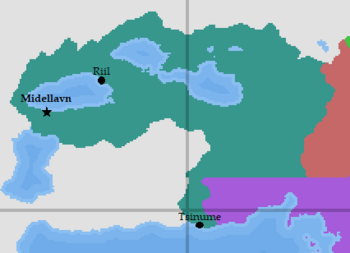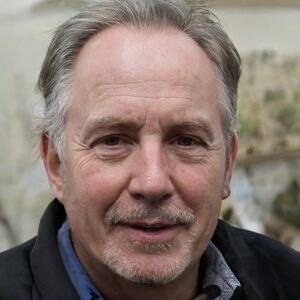Lusatian Lakes
Federation of Lusatian Lakes | |
|---|---|
|
Flag | |
| Motto: "Keenanjs" (lageen) "No fear" | |
| Anthem: We will prevail | |
 Lusatian Lakes in blue | |
| Capital | Midellavn |
| Largest city | Riil |
| Official languages | German (Working language only) |
| Recognised national languages | Lageen, Cicsian |
| Demonym(s) | Lusati |
| Government | Federal parliamentary municipalism |
• Council Chancellor | Kalee Oppest |
• Speaker of the Communal Assembly | Aalexanda Pediinven |
| Legislature | Alting |
| National Council | |
| Communal Assembly | |
| Formation | |
• Unification | TBD |
• Republic established | TBD |
• Current Constitution | 1995 |
| Area | |
• Total | 000 km2 (0 sq mi) |
| Population | |
• 2020 estimate | 6,400,000 |
• Density | 000/km2 (0.0/sq mi) |
| GDP (nominal) | 2020 estimate |
• Total | $175.4 billion |
• Per capita | $27,410 |
| HDI (2019) | 0.728 high |
| Currency | Shenter (SHT) |
| Time zone | UTC |
| Date format | dd/mm/yyyy |
| Driving side | right |
| Internet TLD | .ll, .llk |
Lusatian Lakes, officially the Federation of Lusatian Lakes is a country in the South of Olivacia, bordering Aodhanu and Farale. It is federation consisting of hundreds of small municipalities who organize in a common government.
Etymology
Etymology
History
Geography
The country is divided into two climate zones. The north is defined by a mountainous savanna punctuated by boglands, while the south contains a swampy, subtropical forest. Most noticable feature, however, is the Lusatian Lake Chain, which contains three big and several smaller lakes. The big lakes are: Midall; Oovedzee; Choizee, which Lusatian Lakes borders on its northern shore.
There is a small coast on the Kaldaz Ocean.
Biodiversity
Environment
Government and politics
Lusatian Lakes is a bicameral parliamentary republic, which gives excessive rights to the municipalities of the country.
The Lusatian Lakes fell historically into two factions: The more centralistic oriented lakeside and the anti-nationalist forests in the south. To bridge this gap, that has led to many, often violent, confrontations in the past, the constitution of 1995 was implemented, which introduced a special system of subdivisions, often called "Municipalism".
Every community (which is defined as a (1) connected space of living, (2) shared by at least ten people, who (3) agree on being a community) forms one political division by default. These people constitute a Municipal Council. A MC relies initially on "One person, one vote" and the unanimity principle. However, each council can change their rules at will. While 10 is the lowest number of members, communities can grow way bigger. Communities can merge and divide at will, as long as (1) - (3) are fulfilled. Communities in the lakeside often comprise whole cities, while in the south, splintering into neighborhoods or even houses occurs regularly. Communities can, of course, also cooperate on issues without merging with each other; i.e. the Lusatian Education Board, which consists of 70% of all communities and makes binding decisions on the education system, although any member can leave the board at any moment.
Communities have a large amount of autonomy in almost all fields. While they have to pay a base amount towards the central government agencies, this base amount is reasonably small and the founding of most institutions and expenses is up to the municipality itself. They can also adjust most civil laws, decide about communal/private property, pay out subsidies, etc. This system lends itself to the hybridisation of different political systems: it is not unheard of, that a quasi-syndicalistic community and a quasi-conservative company exist besides each other and cooperates with each other on a wide array of issues. A counterweight to these strong municipalities is the Communal Assembly and the National Council.
Law
Political divisions
Foreign relations
Military
Economy
The biggest export goods are Palm oil, fish, mushrooms and cocoa beans.
The government focuses mainly on developing the tourism sector and aquaculture.

